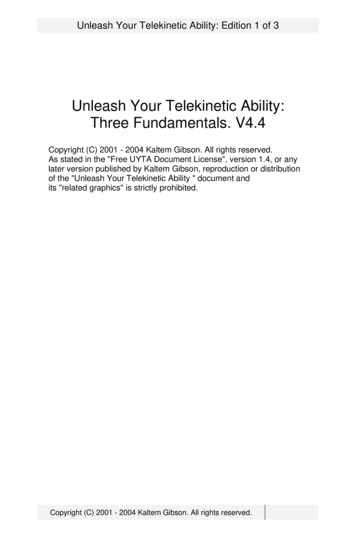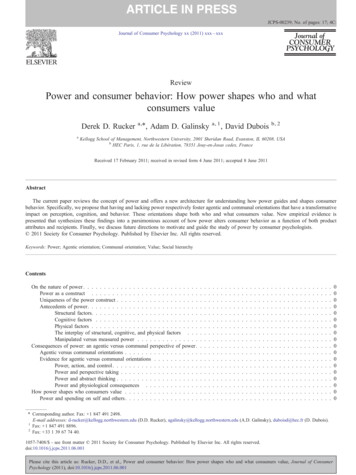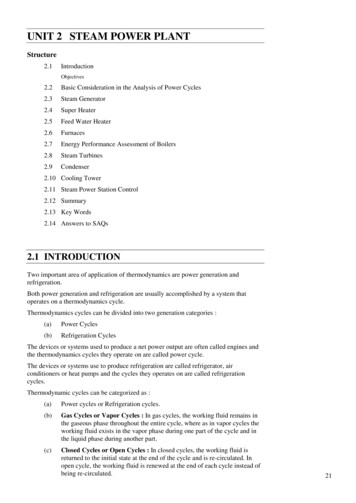
Transcription
RESURRECTIONbyNEVILLE GODDARDThere is nothing to change but our concept of self. Assoon as we succeed in transforming self, our world willdissolve and reshape itself in harmony with that whichour change affirms.1
CONTENTS1. P R A Y E RTHEARTOFB E L I E V I N G, p. 32. FEELING IS THE SECRET, p. 323. OUT OF THIS WORLD, p. 534. FREEDOM FOR ALL, p. 815. RESURRECTION, p.1122
Prayer the Art of BelievingBYNeville3
Contents1. LAW OF REVERSIBILITY, p.52. DUAL NATURE OF CONSCIOUSNESS, p.83. IMAGINATION AND FAITH,p.114. CONTROLLED REVERIE, p.165. LAW OF THOUGHT TRANSMISSION, p.186. GOOD TIDINGS, p.267. THE GREATEST PRAYER, p.294
PREFACEPRAYER is the masterkey. A key may fit onedoor of a house, but whenit fits all doors it may wellclaim to be a master key.Such and no less a key isprayertoallearthlyproblems.Chapter 1LAW OF REVERSIBILITY"Pray for my soul, more things are wrought by prayer than this world dreamsof."(Tennyson).5
PRAYER is an art and requires practice.The first requirement is a controlled imagination. Parade and vainrepetitions are foreign to prayer. Its exercise requires tranquility and peaceof mind."Use not vain repetitions" [Matthew 6:7], for prayer is done in secretand "thy Father which seeth in secret shall reward thee openly" [Matthew6:4; 6:6; 6:18].The ceremonies that are customarily used in prayer are meresuperstitions and have been invented to give prayer an air of solemnity.Those who do practice the art of prayer are often ignorant of the laws thatcontrol it. They attribute the results obtained to the ceremonies and mistakethe letter for the spirit.The essence of prayer is faith; but faith must be permeated withunderstanding to be given that active quality which it does not possess whenstanding alone. "Therefore, get wisdom; and with all thy getting getunderstanding" [Proverbs 4:7].This book is an attempt to reduce the unknown to the known, bypointing out conditions on which prayers are answered, and without whichthey cannot be answered. It defines the conditions governing prayer in lawsthat are simply a generalization of our observations.The universal law of reversibility is the foundation on which its claimsare based.Mechanical motion caused by speech was known for a long timebefore anyone dreamed of the possibility of an inverse transformation, thatis, the reproduction of speech by mechanical motion (the phonograph). For along time, electricity was produced by friction without ever a thought thatfriction, in turn, could be produced by electricity. Whether or not man6
succeeds in reversing the transformation of a force, he knows, nevertheless,that all transformations of force are reversible. If heat can producemechanical motion, so mechanical motion can produce heat. If electricityproduces magnetism, magnetism too can develop electric currents. If thevoice can cause undulatory currents, so can such currents reproduce thevoice, and so on. Cause and effect, energy and matter, action and reactionare the same and inter-convertible.This law is of the highest importance, because it enables you toforesee the inverse transformation once the direct transformation is verified.If you knew how you would feel were you to realize your objective, then,inversely, you would know what state you could realize were you to awakenin yourself such feeling. The injunction, to pray believing that you alreadypossess what you pray for [Mark 11:24], is based upon a knowledge of thelaw of inverse transformation. If your realized prayer produces in you adefinite feeling or state of consciousness, then, inversely, that particularfeeling or state of consciousness must produce your realized prayer. Becauseall transformations of force are reversible, you should always assume thefeeling of your fulfilled wish. You should awaken within you the feeling thatyou are and have that which heretofore you desired to be and possess. This iseasily done by contemplating the joy that would be yours were yourobjective an accomplished fact, so that you live and move and have yourbeing in the feeling that your wish is realized.The feeling of the wish fulfilled, if assumed and sustained, mustobjectify the state that would have created it. This law explains why "Faith isthe substance of things hoped for, the evidence of things not seen" [Hebrews11:1] and why "He calleth things that are not seen as though they were andthings that were not seen become seen" [Approx., Romans 4:17]. Assume7
the feeling of your wish fulfilled and continue feeling that it is fulfilled untilthat which you feel objectifies itself.If a physical fact can produce a psychological state, a psychologicalstate can produce a physical fact. If the effect (a) can be produced by thecause (b), then inversely, the effect (b) can be produced by the cause (a)."Therefore I say unto you, what things soever ye desire, when ye pray,believe that ye have received them, and ye shall have them" (Mark 11:24,E.R.V.).Chapter 2DUAL NATURE OF CONSCIOUSNESSA CLEAR CONCEPT of the dual nature of man's consciousness mustbe the basis of all true prayer. Consciousness includes a subconscious aswell as a conscious part. The infinitely greater part of consciousness liesbelow the sphere of objective consciousness. The subconscious is the mostimportant part of consciousness. It is the cause of voluntary action. Thesubconscious is what a man is. The conscious is what a man knows. "I andMy Father are one [John 10:30], but My Father is greater than I" [John14:28]. The conscious and subconscious are one, but the subconscious isgreater than the conscious."I of Myself can do nothing [John 5:30], the Father within Me, Hedoeth the work" [John 14:10]. I, objective consciousness, of myself can donothing; the Father, the subconscious, He doeth the work. The subconscious8
is that in which everything is known, in which everything is possible, towhich everything goes, from which everything comes, which belongs to all,to which all have access.What we are conscious of is constructed out of what we are notconscious of. Not only do our subconscious assumptions influence ourbehavior but they also fashion the pattern of our objective existence.They alone have the power to say, "Let us make man — objectivemanifestations — in our image, after our likeness" [Genesis 1:26]. Thewhole of creation is asleep within the deep of man and is awakened toobjective existence by his subconscious assumptions. Within that blanknesswe call sleep there is a consciousness in unsleeping vigilance, and while thebody sleeps, this unsleeping being releases from the treasure house ofeternity the subconscious assumptions of man.Prayer is the key which unlocks the infinite storehouse. "Prove menow herewith, saith the Lord of hosts, if I will not open you the windows ofheaven, and pour you out a blessing, that there shall not be room enough toreceive it" [Malachi 3:10]. Prayer modifies or completely changes oursubconscious assumptions, and a change of assumption is a change ofexpression.The conscious mind reasons inductively from observation, experienceand education. It therefore finds it difficult to believe what the five sensesand inductive reason deny. The subconscious reasons deductively and isnever concerned with the truth or falsity of the premise, but proceeds on theassumption of the correctness of the premise and objectifies results whichare consistent with the premise. This distinction must be clearly seen by allwho would master the art of praying.9
No true grasp of the science of prayer can be really obtained until thelaws governing the dual nature of consciousness are understood and theimportance of the subconscious realized.Prayer — the art of believing what is denied by the senses — dealsalmost entirely with the subconscious. Through prayer, the subconscious issuggested into acceptance of the wish fulfilled, and, reasoning deductively,logically unfolds it to its legitimate end. "Far greater is He that is in you thanhe that is in the world" [1 John 4:4].The subjective mind is the diffused consciousness that animates theworld; it is the spirit that giveth life [John 6:63]. In all substance is a singlesoul — subjective mind. Through all creation runs this one unbrokensubjective mind. Thought and feeling fused into beliefs impressmodifications upon it, charge it with a mission, which mission it faithfullyexecutes.The conscious mind originates premises. The subjective mind unfoldsthem to their logical ends. Were the subjective mind not so limited in itsinitiative power of reasoning, objective man could not be held responsiblefor his actions in the world. Man transmits ideas to the subconscious throughhis feelings. The subconscious transmits ideas from mind to mind throughtelepathy. Your unexpressed convictions of others are transmitted to themwithout their conscious knowledge or consent, and if subconsciouslyaccepted by them will influence their behavior.The only ideas they subconsciously reject are your ideas of themwhich they could not wish to be true of anyone. Whatever they could wishfor others can be believed of them, and by the law of belief which governssubjective reasoning, they are compelled to subjectively accept, andtherefore objectively express, accordingly.10
The subjective mind is completely controlled by suggestion. Ideas arebest suggested when the objective mind is partly subjective, that is, when theobjective senses are diminished or held in abeyance.This partly subjective state can best be described as controlled reverie,wherein the mind is passive but capable of functioning with absorption. It isa concentration of attention. There must be no conflict in your mind whenyou are praying. Turn from what is to what ought to be. Assume the mood offulfilled desire, and by the universal law of reversibility you will realize yourdesire.Chapter 3IMAGINATION AND FAITHPRAYERS are not successfully made unless there is a rapportbetween the conscious and subconscious mind of the operator. This is donethrough imagination and faith.By the power of imagination all men, certainly imaginative men, areforever casting forth enchantments, and all men, especially unimaginativemen, are continually passing under their power. Can we ever be certain thatit was not our mother while darning our socks who began that subtle changein our minds? If I can unintentionally cast an enchantment over persons,there is no reason to doubt that I am able to cast intentionally a far strongerenchantment.11
Everything that can be seen, touched, explained, argued over, is to theimaginative man nothing more than a means, for he functions, by reason ofhis controlled imagination, in the deep of himself where every idea exists initself and not in relation to something else. In him there is no need for therestraints of reason. For the only restraint he can obey is the mysteriousinstinct that teaches him to eliminate all moods other than the mood of thefulfilled desire.Imagination and faith are the only faculties of the mind needed tocreate objective conditions. The faith required for the successful operation ofthe law of consciousness is a purely subjective faith and is attainable uponthe cessation of active opposition on the part of the objective mind of theoperator. It depends on your ability to feel and accept as true what yourobjective senses deny.Neither the passivity of the subject nor his conscious agreement withyour suggestion is necessary, for without his consent or knowledge he canbe given a subjective order which he must objectively express. It is afundamental law of consciousness that by telepathy we can have immediatecommunion with another.To establish rapport, you call the subject mentally. Focus yourattention on him and mentally shout his name just as you would to attract theattention of anyone. Imagine that he answered, and mentally hear his voice.Represent him to yourself inwardly in the state you want him to obtain. Thenimagine that he is telling you in the tones of ordinary conversation what youwant to hear. Mentally answer him. Tell him of your joy in witnessing hisgood fortune. Having mentally heard with all the distinctness of reality thatwhich you wanted to hear and having thrilled to the news heard, return to12
objective consciousness. Your subjective conversation must awaken what itaffirmed.“Thou shalt decree a thing and it shall be established unto thee” [Job22:28]. It is not a strong will that sends the subjective word on its mission somuch as it is clear thinking and feeling the truth of the state affirmed. Whenbelief and will are in conflict, belief invariably wins. “Not by might, nor bypower, but by my spirit, saith the Lord of hosts” [Zechariah 4:6].It is not what you want that you attract; you attract what you believeto be true.Therefore, get into the spirit of these mental conversations and givethem the same degree of reality that you would a telephone conversation. “Ifthou canst believe, all things are possible to him that believeth” [Mark9:23]. “Therefore, I say unto you, what things soever you desire, when youpray, believe that ye received them, and ye shall have them” [Mark 11:24].The acceptance of the end wills the means. And the wisest reflectioncould not devise more effective means than those which are willed by theacceptance of the end. Mentally talk to your friends as though your desiresfor them were already realized.Imagination is the beginning of the growth of all forms, and faith isthe substance out of which they are formed. By imagination, that whichexists in latency or is asleep within the deep of consciousness is awakenedand is given form. The cures attributed to the influence of certain medicines,relics and places are the effects of imagination and faith. The curative poweris not in the spirit that is in them, it is in the spirit in which they areaccepted. “The letter killeth, but the spirit giveth life” [2 Corinthians 3:6].13
The subjective mind is completely controlled by suggestion, so,whethe
contents 1. p r a y e r t h e a r t o f b e l i e v i n g, p. 3 2. feeling is the secret, p. 32 3. out of this world, p. 53 4. freedom for all, p. 81











